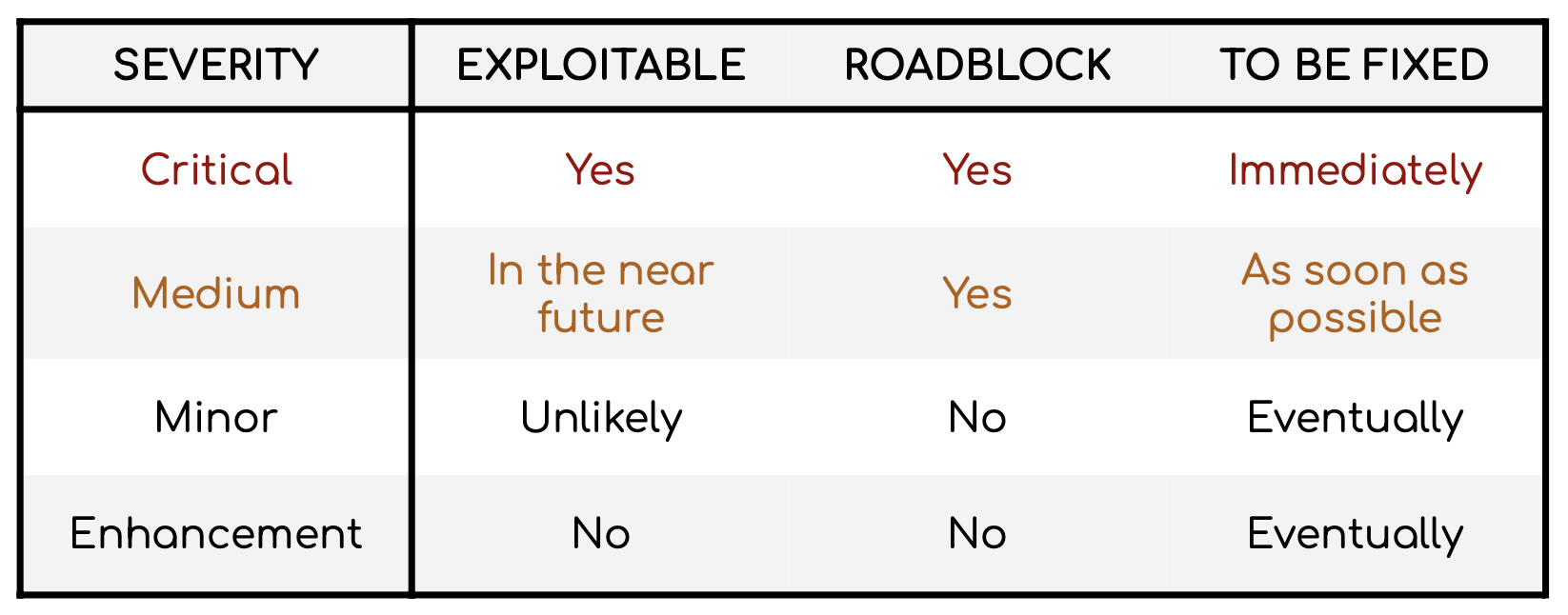Introduction
CoinFabrik was asked to audit the EMDX project. First, we will provide a summary of our discoveries and then we will show the details of our findings.
Summary
The contracts audited are from the EMDX repository at https://github.com/emdx-dex/token-contracts.git. The audit is based on the commit 2a376848d3d0a3604f8c6ca702fe4718019d1b3d. Fixes were made and rechecked based on the commit 2ffe6fa5eba3759275a65f855ae26e5954f4cd6c.
Contracts
The audited contracts are:
- contracts/EMDXToken.sol:SimpleERC20token
- contracts/Vesting.sol:Vestingcontract
Analyses
The following analyses were performed:
- Misuse of the different call methods
- Integer overflow errors
- Division by zero errors
- Outdated version of Solidity compiler
- Front running attacks
- Reentrancy attacks
- Misuse of block timestamps
- Softlock denial of service attacks
- Functions with excessive gas cost
- Missing or misused function qualifiers
- Needlessly complex code and contract interactions
- Poor or nonexistent error handling
- Failure to use a withdrawal pattern
- Insufficient validation of the input parameters
- Incorrect handling of cryptographic signatures
Findings and Fixes

Severity Classification
Security risks are classified as follows:
- Critical: These are issues that we manage to exploit. They compromise the system seriously. They must be fixed immediately.
- Medium: These are potentially exploitable issues. Even though we did not manage to exploit them or their impact is not clear, they might represent a security risk in the near future. We suggest fixing them as soon as possible.
- Minor: These issues represent problems that are relatively small or difficult to take advantage of but can be exploited in combination with other issues. These kinds of issues do not block deployments in production environments. They should be taken into account and be fixed when possible.
- Enhancement: These kinds of findings do not represent a security risk. They are best practices that we suggest implementing. This classification is summarized in the following table:

Issues Found by Severity
Critical Severity
No issues found.
Medium Severity
ME-01 Denial of Service in Vesting.updateScore()
The update score function will not work if any of the transfers in line 172 fails, reverting the transaction.
Recommendation
Use the “Favor pull over push for external calls” pattern to solve this problem. See https: //eth.wiki/howto/smart-contract-safety#favor-pull-over-push-for-external-calls for details.
Solution
The development team informed us that they decided that the “Favor pull over push for external calls” pattern is not required in this instance because:
- less than 10 transfers will be made on each call.
- all the funds required will always be available.
- the token to be used is EMDXToken (in the same git repository and also part of this audit), making it not possible to trigger the denial of service.
ME-02 Possible Overflow in Vesting.updateScore()
An overflow may occur if totalAmount is bigger than 2256/99. This overflow will block the Vesting.updateScore() function on every invocation, stopping the recovery of any token owned by the Vesting contract with a smaller or similar score to the one passed in the _newScore variable.
Hereunder are the lines 157-165 of Vesting.sol. The expression where the overflow will be triggered is _newScore.mul(remainingAmount)
LockVesting memory lock = locks[beneficiaries[i]];
// calculate already vested percentage
uint256 remainingAmount = lock.totalAmount.sub(
lock.releasedAmount
);
// calculate amount to be vested
uint256 releasableAmount = _newScore.mul(remainingAmount).div( 100
);Recommendation
Add a required statement in the Vesting.grantVesting() function checking that the _amount does not exceed 2256/99.
Solution
The issue was fixed by the development team.
Minor Severity
No issues found.
Enhancements
EN-01 SafeMath Libraries Removal
Given that the solidity version is >= 0.8 there is no need to use SafeMath libraries. Usage of “@openzeppelin/contracts/utils/math/SafeMath.sol” in Vesting.sol is not required. See
https: //docs.soliditylang.org/en/v0.8.9/080-breaking-changes.html#how-to-update- your-code for details (section “How to update your code”).
Solution
The development team informed us that they decided not to do this enhancement because they want to minimize the code changes to be made.
Other considerations
Vesting schedule
While in standard vesting schedules the amount that can be vested on each period is decided when the vesting is started, in the Vesting contract the tokens awarded on each period are decided by a score passed by the oracle using the Vesting.updateScore() function in lines 131-185 of Vesting.sol, when each vesting period starts. This includes the option to set the score as 0 or not calling the Vesting.updateScore(), which would not award any tokens for the period.
Conclusion
We found 2 medium-severity issues. Also, an enhancement was recommended.
One of the medium-severity issues was fixed and the other was mitigated. The enhancement was not considered necessary by the development team.
Disclaimer: This audit report is not a security warranty, investment advice, or approval of the EMDX project since CoinFabrik has not reviewed its platform. Moreover, it does not provide a smart contract code faultlessness guarantee.




